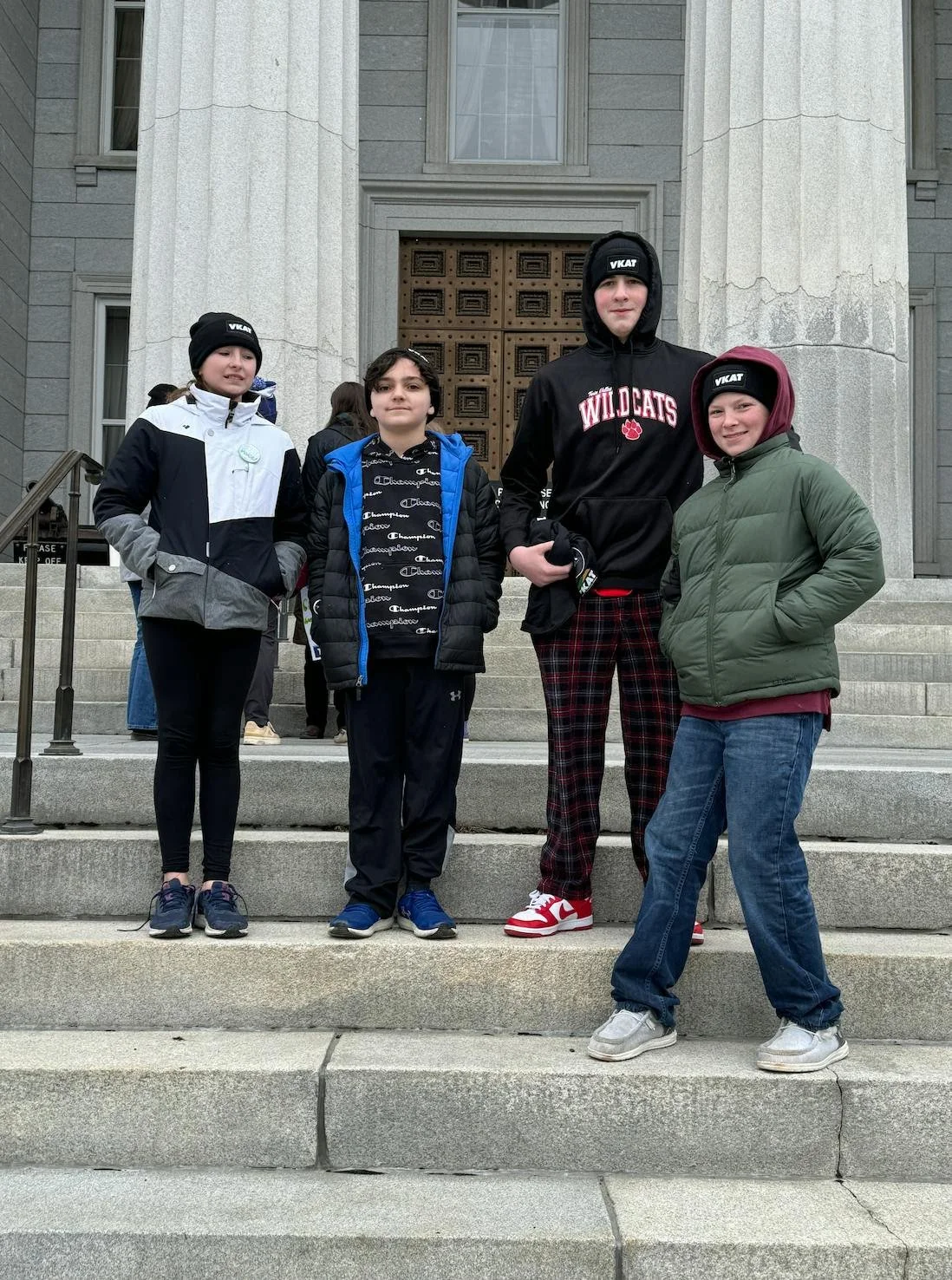"What can a legislator do?" and other middle school questions
2024-02-14
Dear friend,
Happy Wednesday!
I wrote the following legislative update for the Deerfield Valley News -- the kickoff of Week 7 of Vermont’s 2024 legislative session.
How's your Week 7 of 2024 going? Send me a quick note!
Rep. Roberts with Twin Valley Middle High School student leaders - left to right, Jordan Garcy, Davis Cole, Gabe Walling & Elea Cutler
Today was a special day in the State House. With Montpelier two-plus hours away from the Windham-6 legislative district, I was proud to be able to meet with four student leaders representing Twin Valley Middle High School.
Davis Cole, Jordan Garcy, Gabe Walling and Elea Cutler brought their questions and observations to the State House, along with Jen Nilsen with the Deerfield Valley Community Partnership. Here are some of the questions they grilled me on.
Why does it say “Roberts of Halifax” on the seating chart?
The Twin Valley students had examined the House seating chart and found me in seat 26, “Roberts of Halifax.” Each of the 150 Representatives in the House are identified by the town they reside in.
When I rise to speak in the Vermont House, I am called on by the Speaker as “the Representative from Halifax.” This etiquette is one of many examples of “depersonalization.” This helps your elected leaders put our egos aside and focus on what matters—representing you, our constituents.
Many State Reps represent multiple towns, and those are not listed on the chart. However, like many reps, I often introduce myself by saying, “I’m Tristan Roberts, the Representative from Halifax, and I also represent Whitingham and Wilmington.”
What can a legislator do?
The 150 Representatives and 30 Senators in the Vermont General Assembly carry specific responsibilities as provided by the document that all Vermonters have agreed to live under—our Constitution. We swear an oath to uphold both Vermont’s and the U.S. Constitution.
Legislators are elected for a two-year term, which lines up with the two-year legislative “biennium” (in Latin, bi- = two, and -ennium = years).
In that term, we can introduce bills, which is the first step in passing a new law. (See the bills I have introduced and co-sponsored.) We serve on committees in which bills are discussed and revised. When we convene as a group in the House chamber, we can propose amendments to bills, and vote “yay” or “nay” on them (see You have to vote). If the Governor rejects a bill that we pass, we can vote “yay” or “nay” to override that veto.
What are the requirements to become a legislator?
I told the students that once they turned 18 and registered to vote, they were eligible to run for the Legislature and make their case to voters. They expressed surprise that a high-school diploma is not a prerequisite. While this is true, I emphasized that both graduating from high school and also earning higher degrees and gaining job experience were very helpful for me in being informed on the issues that I deal with on a daily basis in Montpelier.
The two youngest members currently serving in the House are Rep. Lucy Boyden of Cambridge (23) and Rep. Esme Cole of Hartford (27). I encouraged the students to register to vote and to make it a habit to vote in every election after they turn 18.
Fewer 18-to-29-year-olds vote compared to the rest of the population, and they have the duty to bring their voice to the process.
What did you need to do to become a legislator?
The students had come to the State House to express their support of S.18, a bill to ban the sale of tobacco products being used by 12-year-olds in classrooms in their school.
Twin Valley students march in support of S.18. Photo: Jen Nilsen
According to these kids, their coaches would not tolerate vaping on the team, and kids doing sports or other after school activities are less likely to become addicted. Each of the students spoke about their athletic and academic interests, which I encouraged.
As a teenager, I was afraid of becoming addicted to nicotine or alcohol (read more about my whole story in About the time I kicked benzos). They say the opposite of addiction is connection, and I dedicated my attention in high school to academics and sports, and then pursued a college degree. That education started me on my career, giving me the experience to serve in the House.
Everyone has a different path. I encouraged the students to continue their interests in sports and academics, and look for ways to volunteer and participate in their community—including running for office.
***
What are your questions or comments? I'm here for it.
warm regards,
Rep. Tristan Roberts
Vermont House of Representatives
P.S. I salute Davis Cole, Jordan Garcy, Gabe Walling & Elea Cutler for visiting their Legislature yesterday!





